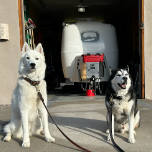-
Posts
780 -
Joined
-
Last visited
-
Days Won
17
routlaw last won the day on August 28 2025
routlaw had the most liked content!
My Info
-
Gender or Couple
Couple
-
Location
Montana
- Website
My RV or Travel Trailer
-
Do you own an Oliver Travel Trailer, other travel trailer or none?
I own an Oliver Travel Trailer
-
Hull #
70
-
Year
2015
-
Make
Oliver
-
Model
Legacy Elite II
-
Floor Plan
Standard Floor Plan
Recent Profile Visitors
routlaw's Achievements
-
Excellent warning Bill. We are used to this sort of thing in our neck of the woods but people in that area certainly are not. Saw the pattern for the storm late last night thought oh boy buckle up down there, looks like a doozy.
-

Winter tire traction for the Oliver
routlaw replied to John and Debbie's topic in General Discussion
One more thought on the subject. Understand that western snow is dry… normally. By that I mean it isn't usually the wet heavy icy stuff so prevalent back east or down south when they rarely get it. What this means is the driving conditions even with snow packed roads are a much different critter than wet ice packed roads. Not saying anyone shouldn't be cautious under these conditions but the differences in driving on dry snow roads is night and day different than back east… the vast majority of the time. It's not uncommon to be on the interstates with snow packed roads and people are still going 70+ MPH out here on the Montanabon. Wyoming is no different. All of the western states are very diligent about plowing too and what doesn't get scraped off either evaporates or melts in fairly short order. There will always be icy spots especially in the shade of cliffs, trees etc but it's truly amazing how fast the remnants after plowing evaporate even in cold temps. Just be cautious and take your time or grab a motel room for the night, or two -

Winter tire traction for the Oliver
routlaw replied to John and Debbie's topic in General Discussion
I have lived in Montana for almost half a century, never used or owned chains and don't plan to. I rarely ever see them on the road either other than 18 wheeler which are required to do so on mountain passes when the snow is heavy. Winter snow tires are the go to situation around here with the Bridgestone Blizzaks usually at the top or Michelin equivalents. Some people will still use studded tires but the only they offer for better performance over the previously mentioned is on black ice. However I have never used the snow tires for towing either though no doubt many have. Not sure I would trust those socks while towing. Just make sure you have a good set or all weather tires if nothing else that also performs well in snow. FWIW there has been very little snow this year so far. Even here in Bozeman where we always seem to be in some sort of polar vortex there is barely any in town. Not a good ski year from what I've heard. -

Pebble Flow trailer and Rivian in the wild
routlaw replied to taylor.coyote's topic in General Discussion
And at what cost. It looks nice, saw some earlier videos of this thing in action. Hardly qualifies as camping IMO. He might get 200 miles up in down the roads in CA but try that east of the Sierra or around the Rocky Mountain Range those towing distances will drop dramatically. -
Yes just read an article about this on Apple News a couple of days ago. Meant to post and link the story but have been busy with some house projects and forgot to do so. Don’t recall all of the specifics but Bill is correct they are in bankruptcy.
-
Yep I did know that. Thanks.
-
Our front graphics are becoming a bit tattered like many others so I might just take what’s left of them off. Personally I don’t think the front being naked looks all that bad myself but do like the company name at the rear which luckily those are still in good condition. The third brake light is totally shot and has been for sometime. Not sure what to do about that other than complete removal. 1st World Problems, not a big deal to me.
-
Never considered it, but for the record we have the Fiama brand and rarely if ever use it. Too much of a PITA to deal with. If you go through with it would love to hear your experiences in changing.
-
We don’t watch TV even when at home, let alone camping. Yanked ours out within the first few months of ownership. Agree with @Wandering Sagebrush the Furion products are crap. It would take a deeply troubled mind to invent a system so difficult to use. Same goes for the Furion audio system, never use it more trouble than its worth.
-

A Convenient Location for the TST TPMS Repeater
routlaw replied to Tom and Doreen's topic in General Discussion
I have never installed mine mainly because it worked flawlessly without it. However with new truck that is supposed to recognize a TPMS system I have yet to get it to do that. Thinking maybe I should install it to see if that helps. Be nice to have it within the trucks system vs having a monitor on the dashboard. -

A Convenient Location for the TST TPMS Repeater
routlaw replied to Tom and Doreen's topic in General Discussion
Mine came with one, but only purchased it a couple of years ago, so apparently the more recent editions have changed with what is included. -

Changing tires in the wild - lessons learned
routlaw replied to John and Jodi's topic in General Discussion
Good grief this is quite a story and horrible experience. Glad you made it through unscathed. May I ask what tires (LT or ST and or brand) you have or had on your Oliver? PSI setting? I can't imagine what would cause so many tire failures in such rapid succession. To answer your questions I suspect you will receive a variety of different answers but I do not carry a jack along and use the built in electric leveling jacks if needed for an emergency. Oliver no longer recommends this but people have been doing it for years. If I were to bring an extra jack it would be a bottle jack stacked on platforms if needed. I have used bottle jacks directly under those plates exactly where the tech used his jack. BTW looking at those rubber grommets on you shocks they seem over tightened and cracking pretty bad. Might want to consider replacing those too. I have an impact wrench which makes for quick work with tire and wheel work but have never carried it along on trips, though I have thought about it for this very reason. Perhaps I should reconsider this. Good luck getting this all figured out. -

Full Suspension Replacement - Alcan Spring and Dexter D52 Axles
routlaw replied to jd1923's topic in Ollie Modifications
An ambitious project! Good luck -

1UP Quik Rack With Oliver Standard 1.25" Receiver
routlaw replied to Rivernerd's topic in Mechanical & Technical Tips
Have you @Rivernerd ever considered the system linked below. It's not a hitch mount which personally I don't care for although I do own the original 1UP double hitch rack but rarely if ever use it. The Ride 88 truck bed mounts are really well engineered and made, which assumes you do not object to placing bikes in the truck bed. I prefer it myself. It does take up some storage room and unless you use a soft cover roll up tonneau will not work with most if not all hard tonneaus but can be implemented with topper shells. The system seems to be very reasonably priced too, far less expensive than most hitch mount systems once you factor in the Oliver hitch receiver. We have carried our road bikes and kayaks doubled up in the truck bed for years, but now that we are transitioning to trail/mountain biking the Ride 88 system seems to be the best I've seen yet. https://www.ride88.com/toyota-tundra -
Until now I have never heard of nor seen curly cable safety chains. Had to look it up to see WTH this was about. Our Ollie #70 came with traditional linked chains but after implementing the Andersen hitch they were too short. Went to the local farm and ranch supply store to purchase a longer set which ended up being considerably heavier duty and also heavier to boot. A mixed blessing I guess. Really appreciate @topgun2 explanation on why one should cross their cables which makes total sense, but never bothered to investigate the reason.











